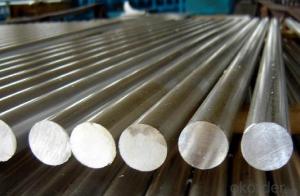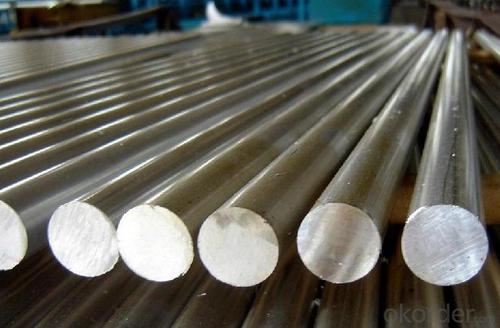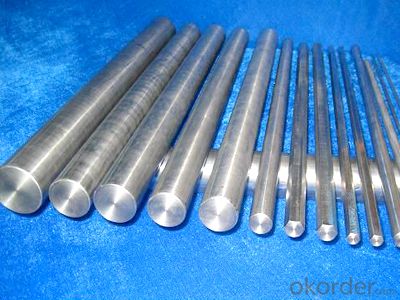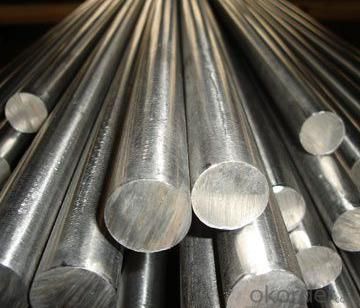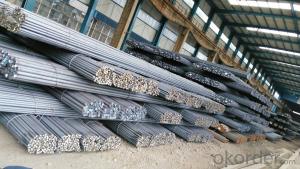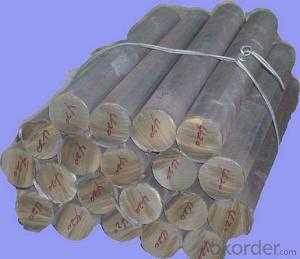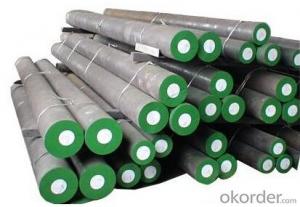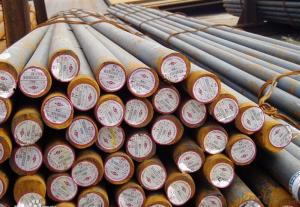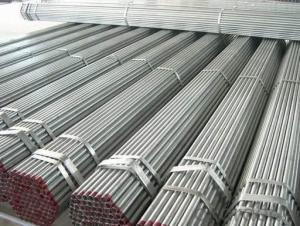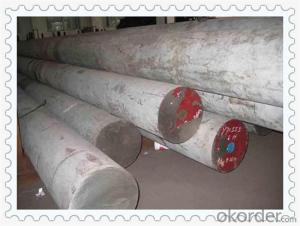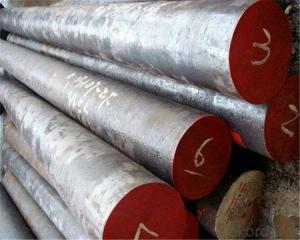JIS SCM440 DIN 42CrMo4 1.7225 Hot rolled AISI 4140 Round Bars Alloy Steel
- Loading Port:
- Shanghai
- Payment Terms:
- TT OR LC
- Min Order Qty:
- 3 m.t.
- Supply Capability:
- 100000 m.t./month
OKorder Service Pledge
OKorder Financial Service
You Might Also Like
Specification
JIS SCM440 DIN 42CrMo4 1.7225 Hot rolled AISI 4140 Round Bars Alloy Steel
Details Information of JIS SCM440 DIN 42CrMo4 1.7225 Hot rolled AISI 4140 Round Bars Alloy Steel
| Name | SAE1045 Carbon Steel Round Bar |
| Shape | Round Bar/Square Bar/Flat Bar/Plate/Wire |
| Standard | GB/ASTM/SAE/AISI/DIN/JIS/EN/BS |
| Surface Treatment: | Black/Peeling/Polished/Machined |
| Delivery Condition: | Hot Rolled or Forged/Peeled or Black Surface |
| Test | SGS/UT 100% Elements Testing |
| Certificate: | ISO/Mill Certificate |
| Service: | 24 hours online service / |
| more than 20 years trading and manufacture | |
| Quality Assurance: | the third party inspection, such as SGS, BV, TUV…etc. is acceptable |
| Packaging Details: | Seaworthy Packaging or as per customer's packing instruction |
| Carbon structure round bar | Q195 Q235A Q235B 10# 20#-55# S45CB |
| Low alloy high strength round bar | Q345A/Q345C/Q345D Q345B Q345E |
| Alloy structure round bar | SAE51B20 20Cr 40Cr 40CrV 20CrMo/30CrMo/35CrMo/42CrMo 20CrMoA/30CrMoA/35CrMoA/42CrMoA/42Cr ML20CrMo/ML30CrMo/ML35CrMo/ML42CrMo B7/SCM435-440 20MnTiB 20CrMnMo 20CrMoH 42CrMoH 40MnB/40MnBH 30Mn2-40Mn2 27SiMn 50CrVA 30CrMnTi |
| Pinion steel | 20CrMnTi 20CrMnTiH 20CrMnTiHCS/20CrMnTiHLD Q20CrMnTi-1/Q20CrMnTi-2 |
| Sucker rod | 20-35CrMoA |
| Free-cutting steel | GT1215S |
| Spring steel | 60Si2MnA 65Mn |
| Ball bearing steel | GCr15 |
Chemical Composition of JIS SCM440 DIN 42CrMo4 1.7225 Hot rolled AISI 4140 Round Bars Alloy Steel
| C | Si | Mn | P | S | Cr | Ni | Cu |
| 0.17-0.24 | 0.17-0.37 | 0.35-0.65 | ≤0.035 | ≤0.035 | ≤0.25 | ≤0.25 | ≤0.25 |
| Tensile strength (σb/MPa) | Yield strength (σb/MPa) | Elongation (δ5/%) |
| ≥410(42) | ≥245(25) | ≥25 |
Company Introduction of JIS SCM440 DIN 42CrMo4 1.7225 Hot rolled AISI 4140 Round Bars Alloy Steel
CNBM International Corporation is the most import and export platform of CNBM group(China National Building Material Group Corporation) ,which is a state-owned enterprise, ranked in 270th of Fortune Global 500 in 2015.
With its advantages, CNBM International are mainly concentrate on Cement, Glass, Iron and Steel, Ceramics industries and devotes herself for supplying high quality series of refractories as well as technical consultancies and logistics solution.
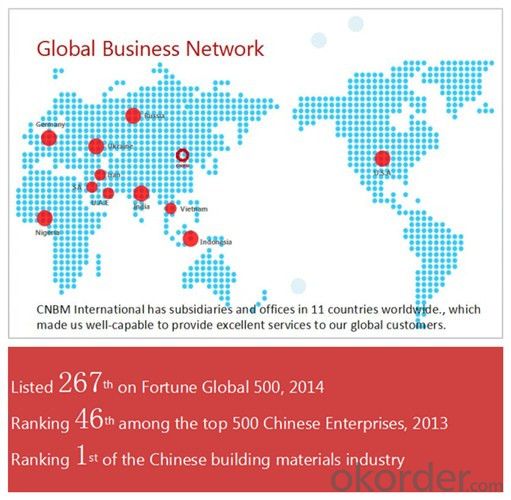
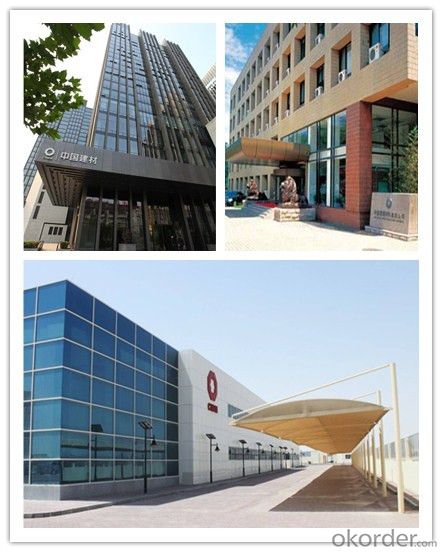
Certificates of JIS SCM440 DIN 42CrMo4 1.7225 Hot rolled AISI 4140 Round Bars Alloy Steel
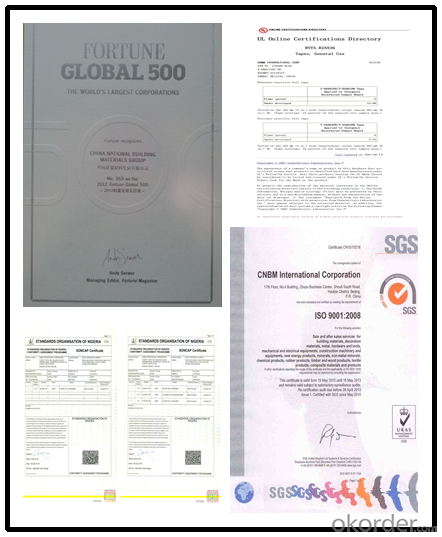
Packaging & Delivery of JIS SCM440 DIN 42CrMo4 1.7225 Hot rolled AISI 4140 Round Bars Alloy Steel
Packaging Detail | Sea worthy packing /as per customer's packing instruction |
Delivery Detail | 15 ~ 40 days after receiving the deposit |
Products show of JIS SCM440 DIN 42CrMo4 1.7225 Hot rolled AISI 4140 Round Bars Alloy Steel
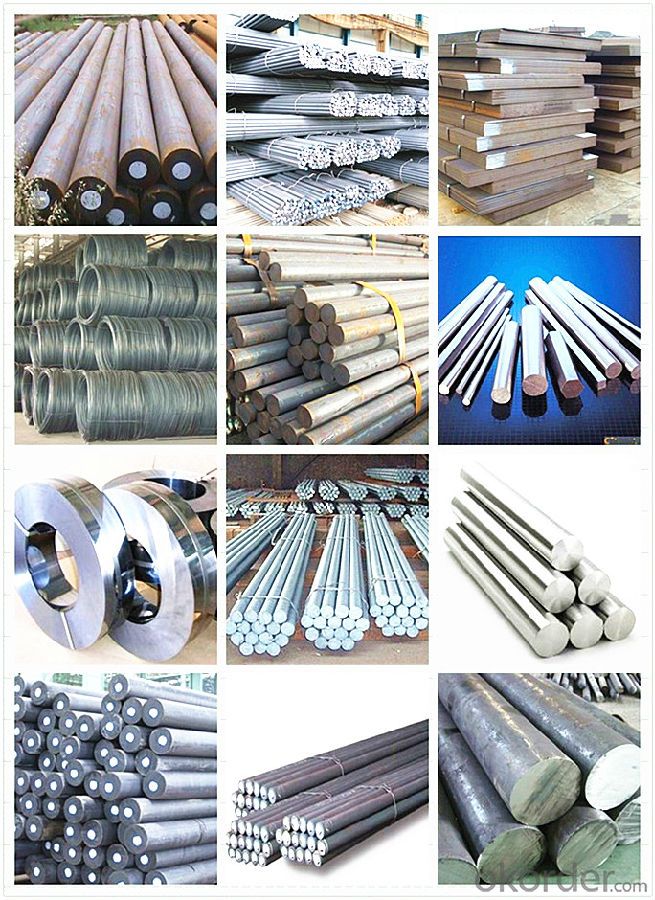
FAQ
Are you a trading company or manufacturer? | Manufacturer |
What’s the MOQ? | 3 metric ton |
What’s your delivery time? | 15-35 days after downpayment received |
Do you Accept OEM service? | Yes |
what’s your delivery terms? | FOB/CFR/CIF |
What's the Payment Terms? | 30% as deposit,70% before shipment by T/T |
Western Union acceptable for small amount. | |
L/C acceptable for large amount. | |
Scrow ,Paybal,Alipay are also ok | |
Why choose us? | Chose happens because of quality, then price, We can give you both. Additionally, we can also offer professional products inquiry, products knowledge train (for agents), smooth goods delivery, excellent customer solution proposals. |
What's your available port of Shipment? | Main Port, China |
What’s your featured services? | Our service formula: good quality+ good price+ good service=customer's trust
|
Where are your Market? | Covering more than 160 countries in the world |
- Q: What are the properties of precipitation-hardening steel?
- Precipitation-hardening steel, also known as PH steel, possesses several unique properties. Firstly, it has excellent strength and toughness, making it suitable for various demanding applications. This type of steel can be heat treated to achieve higher strength levels, allowing it to withstand heavy loads and resist deformation. Additionally, precipitation-hardening steel offers good corrosion resistance, making it ideal for use in harsh environments. It also exhibits good machinability, enabling ease of fabrication. These properties make precipitation-hardening steel a versatile material widely used in industries such as aerospace, automotive, and medical.
- Q: What are the advantages of using special steel in manufacturing?
- There are several advantages of using special steel in manufacturing. Firstly, special steel offers a higher level of strength and durability compared to regular steel. This is due to the presence of various alloying elements such as chromium, nickel, and manganese, which enhance the material's mechanical properties. As a result, special steel can withstand heavy loads, resist wear and tear, and endure extreme conditions, making it an ideal choice for manufacturing applications that require high strength and longevity. Secondly, special steel provides excellent corrosion resistance. The addition of alloying elements like chromium forms a protective oxide layer on the surface of the steel, preventing it from rusting or corroding when exposed to moisture or harsh environments. This corrosion resistance is crucial in industries such as marine, automotive, and construction, where the materials are constantly exposed to water, salt, and chemicals. Furthermore, special steel offers exceptional heat resistance and heat transfer properties. These properties are crucial in manufacturing processes that involve high temperatures, such as forging, casting, and heat treatment. Special steel can retain its strength and structural integrity even at elevated temperatures, allowing manufacturers to produce components that need to withstand extreme heat conditions. Another advantage of using special steel in manufacturing is its versatility. Special steel can be easily customized and tailored to meet specific requirements. It can be modified to exhibit various mechanical properties, such as hardness, toughness, or flexibility, depending on the application. This flexibility allows manufacturers to develop components with precise characteristics, ensuring optimal performance and efficiency. Lastly, special steel is often more cost-effective in the long run. Although the initial costs of special steel may be higher than regular steel, its superior durability and longevity result in reduced maintenance and replacement costs. Additionally, the enhanced properties of special steel can lead to improved energy efficiency and reduced material waste, contributing to overall cost savings in the manufacturing process. In conclusion, the advantages of using special steel in manufacturing include increased strength and durability, excellent corrosion resistance, superior heat resistance, versatility, and long-term cost-effectiveness. These benefits make special steel a preferred choice for various industries, ensuring the production of high-quality and reliable components.
- Q: How does special steel contribute to the transportation sector?
- Special steel is essential for the transportation sector as it offers numerous benefits that contribute to the efficiency, safety, and overall performance of vehicles. One of the primary ways special steel contributes to the transportation sector is through its high strength-to-weight ratio. By using special steel alloys, manufacturers can reduce the weight of vehicles without compromising their structural integrity. This, in turn, leads to improved fuel efficiency, reduced emissions, and lower operating costs. Furthermore, special steel is highly resistant to corrosion, which is especially beneficial in areas with harsh weather conditions or exposure to saltwater, such as coastal regions or winter roadways where salt is used to melt ice. This corrosion resistance helps extend the lifespan of transportation infrastructure, including bridges, tunnels, and railways, minimizing maintenance and replacement costs. Another important aspect is the excellent impact resistance of special steel. It has the ability to withstand heavy impacts and collisions, making it ideal for the construction of vehicle frames, body panels, and safety components. This enhances passenger safety and reduces the risk of severe injuries during accidents. Special steel also plays a crucial role in the production of high-performance engines and powertrains. Steel alloys with specific characteristics, such as high temperature resistance and wear resistance, are utilized in the manufacturing of critical engine components like pistons, crankshafts, and camshafts. This ensures long-lasting and efficient engine performance, resulting in improved reliability and reduced downtime. In addition to these factors, special steel contributes to the transportation sector by enabling advancements in electric and hybrid vehicles. The unique properties of certain steel alloys allow for the development of lightweight battery packs, electric motor components, and charging infrastructure. These advancements aid in the transition to greener forms of transportation and help reduce the environmental impact of the sector. Overall, special steel has a profound impact on the transportation sector by providing lightweight, durable, corrosion-resistant, and impact-resistant materials. It not only enhances the performance and safety of vehicles but also contributes to sustainable and efficient transportation systems.
- Q: What are the properties of corrosion-resistant stainless steel?
- Corrosion-resistant stainless steel has several key properties. Firstly, it has a high level of chromium content, typically around 10-20%, which forms a protective oxide layer on the surface of the steel. This oxide layer acts as a barrier, preventing oxygen and moisture from reaching the underlying metal and causing corrosion. Additionally, stainless steel contains other alloying elements such as nickel, molybdenum, and nitrogen, which further enhance its corrosion resistance. These alloys help to stabilize the oxide layer and make it more resistant to corrosion by aggressive substances such as acids, salts, and chlorides. Furthermore, stainless steel is highly durable and has excellent strength, making it suitable for various applications in corrosive environments, including marine, chemical, and food processing industries.
- Q: How does special steel contribute to the construction of bridges?
- Special steel plays a crucial role in the construction of bridges by offering superior strength, durability, and corrosion resistance. It allows engineers to design lighter and more efficient bridge structures, leading to cost savings and reduced environmental impact. The use of special steel also enhances the overall safety and longevity of bridges, ensuring their ability to withstand heavy loads, extreme weather conditions, and the test of time.
- Q: How does special steel contribute to the medical industry?
- Special steel contributes to the medical industry by providing the necessary materials for the production of medical equipment and devices. Its unique properties such as high strength, corrosion resistance, and biocompatibility make it ideal for manufacturing surgical instruments, implants, and prosthetics. Special steel also ensures the safety and effectiveness of medical tools, as it can withstand sterilization processes and maintain its integrity during procedures. Overall, special steel plays a crucial role in advancing medical technology and improving patient care.
- Q: How does special steel contribute to the manufacturing of surgical instruments?
- Special steel, which is also known as stainless steel, plays a vital role in the production of surgical instruments. Its exceptional properties make it an ideal material for manufacturing high-quality surgical instruments used in various medical procedures. To begin with, special steel exhibits a high resistance to corrosion and rust. Surgical instruments are constantly exposed to bodily fluids, sterilization processes, and harsh cleaning agents. The corrosion resistance of special steel guarantees the durability of these instruments, enabling them to withstand repeated use and cleaning without compromising their integrity. Furthermore, special steel possesses excellent strength and hardness characteristics. Surgical instruments must be robust and capable of withstanding the forces and pressures exerted during surgeries. The high strength and hardness of special steel ensure that these instruments retain their shape and sharpness even after multiple uses, minimizing the risk of breakage or deformation during critical procedures. Moreover, special steel is biocompatible, meaning it does not elicit reactions or complications when in contact with bodily tissues or fluids. This is particularly important for surgical instruments that come into direct contact with patients' bodies. The biocompatibility of special steel guarantees that there are no adverse reactions or complications when these instruments are used in surgeries, thereby reducing the risk of infections or other complications. In addition, special steel is highly machinable and can be easily molded into intricate shapes and designs. Surgical instruments require precision and accuracy to effectively fulfill their intended functions. The machinability of special steel allows manufacturers to create complex instruments with fine details and features, ensuring their optimal performance during surgical procedures. Furthermore, special steel can be efficiently sterilized. Sterilization is a critical step in ensuring the safety and effectiveness of surgical instruments. Special steel's ability to withstand high temperatures and various sterilization methods, such as autoclaving or ethylene oxide gas sterilization, makes it an ideal choice of material for surgical instruments. In conclusion, special steel significantly contributes to the manufacturing of surgical instruments due to its corrosion resistance, strength, biocompatibility, machinability, and sterilization capabilities. These properties guarantee that surgical instruments made from special steel are durable, reliable, safe, and effective in medical procedures, ultimately enhancing the success of surgeries and improving patient outcomes.
- Q: How does special steel contribute to improving product resistance to environmental factors?
- Special steel contributes to improving product resistance to environmental factors in several ways. Firstly, special steel alloys often have enhanced corrosion resistance, protecting the product from damage caused by exposure to moisture, chemicals, and other corrosive substances present in the environment. Additionally, special steel can offer improved strength and durability, enabling the product to withstand harsh conditions such as extreme temperatures, high pressure, or mechanical stress. Furthermore, special steel can exhibit excellent fatigue resistance, ensuring that the product maintains its structural integrity even after prolonged exposure to cyclic loading or repetitive stress. Overall, the unique characteristics of special steel make it a valuable material for enhancing the resistance of products to various environmental factors, ultimately prolonging their lifespan and reducing maintenance costs.
- Q: How does special steel contribute to the automotive suspension industry?
- Special steel plays a crucial role in the automotive suspension industry by providing enhanced strength, durability, and performance to suspension components. Special steel alloys, such as high-strength low-alloy (HSLA) steel, are specifically designed to withstand the rigorous demands of the suspension system, ensuring optimal performance and safety. One of the key benefits of special steel in the automotive suspension industry is its exceptional strength-to-weight ratio. Suspension components made from special steel alloys are able to withstand heavy loads and resist deformation, leading to improved handling, stability, and overall vehicle performance. This strength also contributes to increased durability, reducing the likelihood of premature component failure and extending the lifespan of the suspension system. Moreover, special steel offers superior fatigue resistance, which is crucial in the suspension industry where components are subjected to repetitive stress and vibrations. This fatigue resistance helps to prevent cracks and fractures in suspension parts, ensuring reliable and safe operation even under challenging conditions. In addition, special steel alloys can provide enhanced corrosion resistance, protecting suspension components from the detrimental effects of moisture, salt, and other environmental factors. This corrosion resistance helps to prolong the lifespan of the suspension system, reducing maintenance costs and improving overall reliability. Furthermore, special steel allows for improved design flexibility in suspension components. Its unique properties, such as high formability and weldability, enable manufacturers to produce complex and lightweight designs, resulting in more efficient suspension systems. These lightweight designs not only contribute to fuel efficiency and reduced emissions but also enhance the overall driving experience by improving vehicle agility and responsiveness. In summary, special steel is vital to the automotive suspension industry as it provides enhanced strength, durability, and performance to suspension components. Its exceptional strength-to-weight ratio, fatigue resistance, corrosion resistance, and design flexibility contribute to improved handling, stability, safety, and overall vehicle performance. Through its unique properties, special steel helps to ensure reliable and efficient suspension systems, meeting the demanding requirements of the automotive industry.
- Q: How does special steel perform in terms of thermal conductivity?
- Special steel typically has lower thermal conductivity compared to other materials. This means that it is not as efficient in conducting heat and may retain heat for longer periods of time.
Send your message to us
JIS SCM440 DIN 42CrMo4 1.7225 Hot rolled AISI 4140 Round Bars Alloy Steel
- Loading Port:
- Shanghai
- Payment Terms:
- TT OR LC
- Min Order Qty:
- 3 m.t.
- Supply Capability:
- 100000 m.t./month
OKorder Service Pledge
OKorder Financial Service
Similar products
Hot products
Hot Searches
Related keywords
